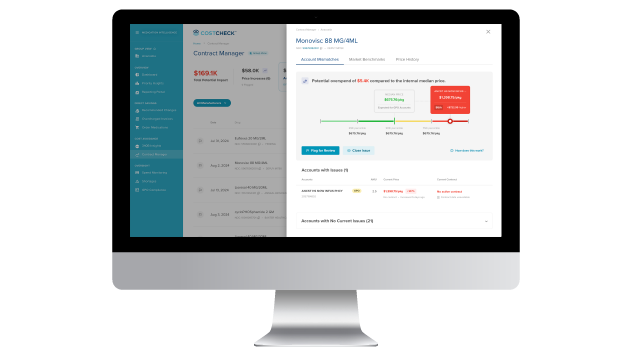When it comes to drug purchasing, hospitals face market volatility and complex intricacies that aren’t easy to track. For instance, the average hospital needs to review thousands of possible price increases daily and has anywhere from four to 700+ purchasing accounts for a single facility. Hospital pharmacy teams are often tasked to reduce spend from their drug budgets, but getting ahead of price increases, contract misalignments, and overcharges while maintaining GPO compliance and keeping the hospital stocked with the right inventory is a daunting task.
Recently, CostCheck hosted a webinar with UNC Health to discuss these challenges and how utilizing a contract monitoring tool can simplify spend reduction at hospitals. Samantha Aston, Director of Pharmacy at UNC Health shared her team’s learnings, best practices, and successes in using a contract tool.
Simplifying Complexities with CostCheck’s Contract Manager
CostCheck’s new Contract Manager module proactively evaluates price fluctuations and contract errors in real-time – flagging anomalous increases, outlier accounts being overcharged, and quantifying the impact. Unique to CostCheck is a dual benchmarking approach that shows health systems how their contracts align system-wide as well as comparing their prices against market averages. These features give pharmacy leaders visibility into contract performance, ensuring they are both in line with internal standards and achieving fair pricing in the market. For each issue identified, the Contract Manager initiates a process to review, take action, and follow up – ensuring no opportunity to save is left behind.
Using Contract Manager Across Retail and Acute
With over 60% of hospital drug spend outside of the inpatient setting, it’s critical for hospitals to evaluate their drug spend in outpatient, retail, and clinic settings as well as inpatient to achieve impactful results for the whole organization. For instance, during the webinar Aston shares that UNC Health uses Contract Manager as a tool for both acute and retail pharmacies system-wide. Their workflow includes individuals using the tool at least twice weekly, gathering into 30-minute bi-weekly meetings to discuss savings opportunities, then individually pursuing the savings opportunities they own between each meeting.
Proactively Benchmarking Contracts
Unique to CostCheck’s Contract Manager is a dual benchmarking capability that shows health systems how their contracts compare system-wide as well as benchmarking their prices against market averages. These features give pharmacy leaders visibility into contract performance, ensuring they are both in line with internal standards and achieving fair pricing in the market. “The internal contract comparison is super intuitive, and it’s helping me quickly identify issues across all of my accounts,” shared Aston. “We already knew there were issues, but now it’s highlighted for me.”
Saving More in Less Time
To track and compare contracts including pinpointing misloads, many hospitals and systems will use spreadsheets, complicated formulas, and manual line-by-line comparisons. Aston reflects that transitioning from manual comparison to CostCheck’s Contract Manager is “a huge time saver,” adding that the team had a hunch on certain contract misalignments, but didn’t realize the extent of the issues they could resolve until CostCheck flagged a list of opportunities. In one example, Aston estimates that after two new own-use accounts were set up, the UNC Health team instantly identified $4,000 in monthly savings – a massive impact on their bottom line, considering the low total script volume across the facilities. In another example, the software detected a single contract drop in real-time – an error that otherwise would have gone undetected by the pharmacy team. By using Contract Manager, not only did the team identify the issue immediately, but also resolved it and received a credit and rebill within just one week.
Best Practices for Using a Contracting Management Tool
For hospitals and health systems considering a contract management and monitoring tool for their organization, consider these recommendations:
- Use your contract management tool frequently or at least on a weekly cadence to keep an eye on market fluctuations and possible contract loading errors
- For quick resolution with your GPO or wholesaler on contract issues, include specific details regarding each affected account and contract in your request
- As you’re learning to use the tool, start small with resolving a single issue all the way through before beginning to tackle your full list of savings opportunities
- If you are not currently using CostCheck, request a demo to learn how your hospital can save up to 4% of annual drug spend



